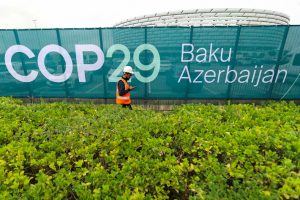A patchwork quilt of global agreements is slowly being established to combat global warming. The latest effort, achieved at the COP29 climate summit in Baku, Azerbaijan, is part of growing moves to reduce methane emissions.
More than 30 countries have backed the COP29 Declaration on Reducing Methane from Organic Waste, including eight of the 10 biggest emitters of methane from organic waste, according to a report from the summit.
Methane is a ‘super pollutant’ blamed for respiratory diseases that kill about a million people a year, and regarded as one of the worst of the seven greenhouse gases warming the planet at a troubling rate.
ALSO SEE: COP29 Carbon Markets Deal Faces Credibility Test
Methane is a beast of a problem, stemming from a wide range of sources, and extremely hard to detect because it cannot be seen by the human eye and has no obvious odour.
Methane emissions have been overlooked because there were a lack of tools to detect or measure it. Before the development of satellites with equipment capable of exposing leaks, it could only be revealed by handheld devices or via aerial flyovers that showed its interaction with light waves.
Some methane emissions emerge from natural sources like wetlands or volcanic gas. But a bigger proportion comes from human activity, such as the oil and gas sector, coal mines, plus agriculture and landfill waste.
There have also been claims that oil and gas companies have found ways to hide the magnitude of their emissions, according to analysis by the Financial Times last week, which noted the lack of accurate methane data on a global basis.
These are the areas that governments, activists, oil companies and satellite monitors are now focusing on.
The ‘waste agreement’ may not sound like much, but given the scale and complexity of the emissions crisis, activists and negotiators say it’s a positive and useful outcome.
The United States, Germany, Britain and the United Arab Emirates were among countries that endorsed the declaration at a presidential meeting on Tuesday. The European Commission is said to have welcomed the declaration, but EC reps said they would consult with member states first before endorsing the move.
Waste blamed for 20% of human-caused methane
Methane is responsible for a third of net warming since the pre-industrial era. And the waste sector, which releases methane when organic waste such as food, paper, cardboard, bodily waste, breaks down in landfills, dumpsites and wastewater facilities that are oxygen-free environments.
The waste sector is estimated to contribute about a fifth (20%) of methane emissions from human activity.

The methane declaration involved countries committing to target food waste within their Nationally Determined Contributions (NDC), Yalchin Rafiyev, the lead negotiator for COP29, said.
“Previous COPs have already made progress on the Global Methane Pledge [signed by over 150 countries to reduce global methane emissions by 30% by 2030]. To deliver on the pledge, we need to address all sectors like agriculture, wastes and fossil fuel. To build and complement these measures, we launched this declaration to reduce methane from organic wastes,” Rafiyev explained at the press conference.
The move this week follows the Oil and Gas Decarbonization Charter, launched by the COP28 President in Dubai last year, which was signed by 50 industries to achieve near-zero upstream methane emissions.
“COP28 focused on methane emissions from the fossil fuel sector and COP29 is focusing on waste,” Rick Duke, the US Deputy Special Envoy for Climate, said at the presidency event earlier on Tuesday.
And it was possible that the COP30 event being held in Brazil will target methane emissions from the agricultural sector, he said.
The declaration will focus on five areas — countries’ national contributions (NDCs), regulation, data, finance and partnership.
‘We need more data’
Inger Andersen, the UN Under-Secretary-General and head of the UN Environment Programme, said countries needed to draw up regulations and understand the best practices in other countries.
“We need data on where does the waste come from and how to tackle it,” she said. “We need finance in solid waste management. This is critical. We also need partnerships across the board so we can learn from each other. If we tackle waste, we can tackle health of people living around, and groundwater as well.”
The Climate and Clean Air Coalition (CACC) – a group of more than 160 governments and bodies working to cut pollutants such as methane – said that while satellites can help quantify emissions from landfill sites, officials need to collect data at landfill and dump sites, because methane emissions vary over a year.
“We do not have enough data at the moment .. having more data would help with monitoring, reporting and verification. When we want to see how much we have been progressing and cleaning up, it is good to have a solid baseline.
“It is important to get investments to help capture the methane, and then methane can help with access to energy. And then we have to have a bridging mechanism, because you can sell the energy afterwards. So we have to have a bridging mechanism to get the revenues throughout the time to pay back the capital that was put into it.
“But the more we go upstream, the more interesting things can become, and then it is about creating business opportunities.”
- Jim Pollard
NOTE: Photos at the top and amid the text of this report were changed on November 20, 2024.
ALSO SEE:
Satellite Finds Methane, CO2 Plumes Over Sites in Asia, Africa, US
Could Melting Glaciers Trigger Volcanic Eruptions? – Reuters
Funding Gap Hurts Climate Talks While World Faces 3.1C Warming
Climate Change Has Cost China $32 Billion in Just One Quarter
Scientists Fear Nature’s Carbon Sinks Are Failing – Guardian
Floods or Drought: Climate Change Worsens Global Water Woes
Climate Change ‘Fuelled’ Rain That Led to Fatal Indian Landslides
Energy Emissions Set to Peak But ‘Not in Time’ For Climate Goals
LNG’s Carbon Footprint 33% Bigger Than Coal’s – CC
























